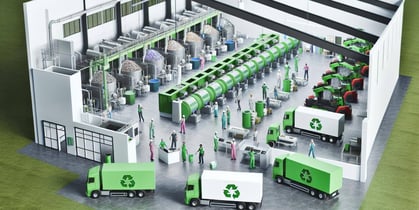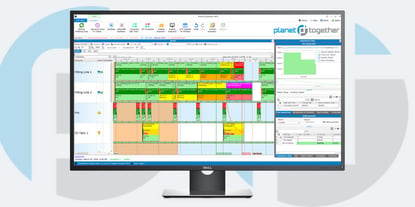Development of Bio-Based Materials for Eco-Friendly Manufacturing
In production planning within the food and beverage manufacturing industry, sustainability has become a vital concern. As global awareness of environmental issues grows, there is a pressing need to adopt eco-friendly practices throughout the supply chain. One significant step towards achieving this goal is the development and integration of bio-based materials into manufacturing processes.
In this blog, we will explore the importance of bio-based materials, their role in eco-friendly manufacturing, and how integration with advanced planning systems like PlanetTogether can enhance their implementation within existing production frameworks.

The Rise of Bio-Based Materials
Bio-based materials, derived from renewable sources such as plants, algae, or even waste products, offer a compelling alternative to traditional petroleum-based materials. These materials are inherently sustainable, as they have the potential to reduce greenhouse gas emissions, minimize reliance on finite resources, and mitigate environmental pollution. Moreover, bio-based materials can often be biodegradable, further reducing their ecological footprint.
In the food and beverage industry, where packaging, containers, and utensils are ubiquitous, the adoption of bio-based materials holds significant promise. From compostable packaging made from plant-based polymers to biodegradable cutlery crafted from corn starch, manufacturers have a wealth of eco-friendly options at their disposal. By embracing bio-based materials, companies can align their operations with the principles of circular economy, fostering resource efficiency and waste reduction.
Challenges and Opportunities
Despite their numerous benefits, the widespread adoption of bio-based materials presents several challenges. Chief among these is the need for efficient production processes and supply chain management. Unlike traditional materials, which often have well-established supply chains and manufacturing methods, bio-based materials may require specialized equipment, technologies, and sourcing strategies.
This is where advanced planning systems such as PlanetTogether come into play. By integrating with enterprise resource planning (ERP), supply chain management (SCM), and manufacturing execution systems (MES), PlanetTogether provides production planners with the tools they need to optimize operations and incorporate bio-based materials seamlessly.
Whether it's forecasting demand for bio-based packaging or coordinating the procurement of renewable raw materials, PlanetTogether's advanced algorithms and real-time data analytics enable planners to make informed decisions that drive sustainability initiatives forward.

Integration with ERP, SCM, and MES Systems
The integration between PlanetTogether and leading ERP, SCM, and MES systems, including SAP, Oracle, Microsoft Dynamics, Kinaxis, and Aveva, represents a significant milestone in the quest for eco-friendly manufacturing. By leveraging the data synchronization capabilities of these platforms, production planners can ensure seamless communication across departments, streamline inventory management, and synchronize production schedules with demand forecasts.
For example, imagine a food and beverage manufacturer that decides to transition from conventional plastic packaging to bio-based alternatives. With the integration of PlanetTogether and SAP, the production planner can assess the availability of bio-based materials in real-time, analyze their cost-effectiveness compared to traditional options, and adjust production schedules accordingly.
Moreover, by linking production data with customer orders and inventory levels, the planner can optimize resource allocation, minimize waste, and meet sustainability targets without sacrificing operational efficiency.
Benefits of Integration
The integration between PlanetTogether and ERP, SCM, and MES systems offers several key benefits for production planners in the food and beverage industry:
Enhanced Visibility: By centralizing data from disparate systems, integration provides production planners with a holistic view of the supply chain, enabling them to identify potential bottlenecks, anticipate resource constraints, and proactively address issues before they escalate.
Improved Decision-Making: With access to real-time insights and predictive analytics, planners can make data-driven decisions that optimize production processes, minimize environmental impact, and maximize resource utilization.
Increased Agility: Integration enables agile responses to changing market dynamics, customer preferences, and regulatory requirements, allowing companies to adapt quickly to evolving sustainability standards and consumer expectations.
Cost Savings: By optimizing inventory levels, reducing waste, and minimizing production downtime, integration helps companies achieve cost savings while advancing their sustainability goals.
The development of bio-based materials represents a significant opportunity for eco-friendly manufacturing in the food and beverage industry. By integrating advanced planning systems like PlanetTogether with ERP, SCM, and MES platforms, companies can streamline the adoption of bio-based materials, optimize production processes, and achieve their sustainability objectives.
As global demand for sustainable products continues to rise, embracing bio-based materials is not just a moral imperative but also a strategic imperative for long-term business success. By leveraging technology and collaboration across the supply chain, production planners can pave the way for a greener, more resilient future.
Are you ready to take your manufacturing operations to the next level? Contact us today to learn more about how PlanetTogether and integrated scheduling solutions can help you achieve your sustainability goals and drive success in the food and beverage industry.






















LEAVE A COMMENT